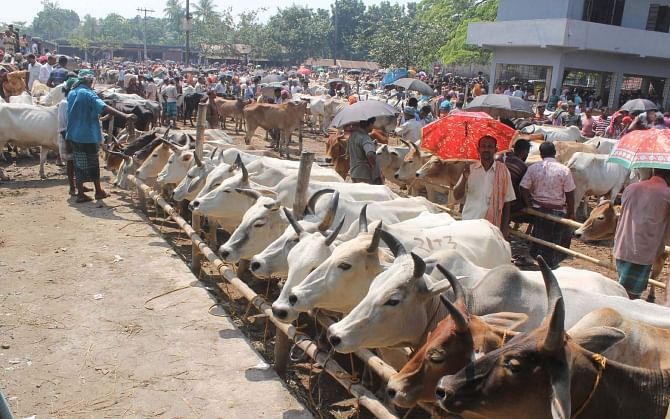Thousands of cattle are sold a day at Bagachra Satmile haat
Thousands of cattle are sold a day at Bagachra Satmile haat

A large number of sacrificial cattle are brought in from India mostly illegally through different border points under Jessore and Satkhira districts and put on sale at bordering Bagachra Satmile cattle market under Sharsha upazila of the district.
Traders from 20 districts, including Dhaka, Kushtia, Sirajganj, Jhenidah, Chapainawabganj, Chittagong, Faridpur and Noakhali, come to the market, about 37 miles away from Jessore town.
Around 15,000-20,000 cattle are kept in the market, the largest of its kind in the south-western region, for sale on every haat day (Saturday and Tuesday) while on an average nearly 10,000 cattle are sold.
Expressing satisfaction over the sale of sacrificial cattle in the market, Upazila Nirbahi Officer (UNO) ATM Shariful Islam said the government is earning a good amount of revenue from the market as Tk 100 is being realised against sale of each cattle.
Cattle trader Faird Gazi, who came from Chittagong to purchase cattle in the market, said he has bought 123 Indian cattle and sent two truckloads of cattle to Sagarika Cattle Market in Pahartoli of Chittagong.
The cattle trader said he will sell each of the cattle for Tk 60,000-1, 20,000 and added that he has to spend Tk 1,000-2,000 as transportation cost for sending each cattle to the capital.
A cattle trader from India, Debprasad Mondol, said it takes five to seven days to take cattle from different Indian states to the border. He said they cannot feed the cattle while bringing them to border.
For this, dichlorophen injection is pushed into the bodies of the cattle so that they remain fresh and fit after tedious journey, said the Indian cattle trader.
Contacted, Sharsha upazila livestock officer Mihir Kanti Biswas said they are unable to ascertain whether the cattle are injected with dichlorophen as they do not have the facility for health check-up of the cattle.
Another story from Lalmonirhat adds: About 700 people, mostly unemployed youths, are engaged in taking the smuggled cattle to local haats (village markets) through 27 points of the district's border stretching 195 kilometres especially at night as they get Tk 1,000-2,000 per cattle.
Over the last one week, Indian Border Security Force (BSF) detained a number of youths when they were bringing cattle illegally through the border points, law enforcers said.
Such detainees often become victims of brutal torture by the BSF men and/or land in Indian jail.